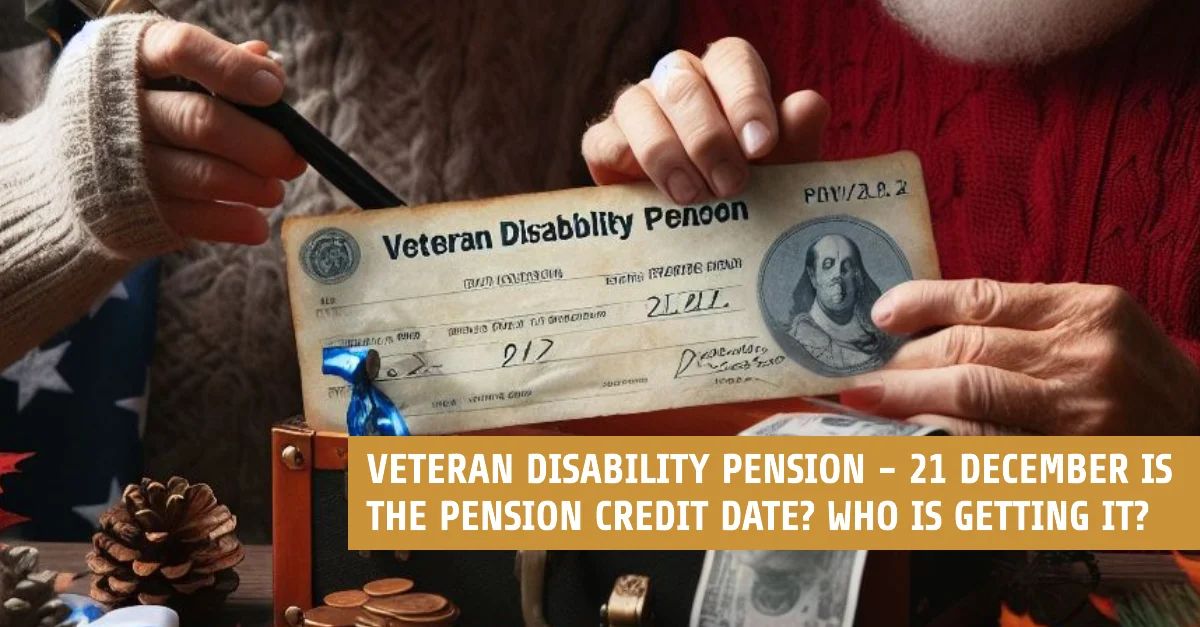For Advertising Contact Us
Veteran Disability Pension – 21 December is The Pension Credit Date? Who is Getting it?

You may have heard about the upcoming 21 December pension credit date for veteran disability pension recipients, but do you know who exactly is eligible to receive it? In this guide, we will probe into the details of this critical date, what it means for veterans, and who qualifies for this important financial benefit. Stay informed and ensure you are aware of your entitlements as a veteran.
Types of Veteran Disability Pensions
The Veteran Disability Pension comes in various forms, tailored to address the specific needs of veterans who have served their country. Understanding the different types of pensions available is crucial in ensuring that eligible veterans receive the support they deserve.
Service-Connected Disability Compensation
Pensions for Service-Connected Disability Compensation are awarded to veterans who have sustained an injury or developed a medical condition during their military service. These disabilities are considered directly related to their time in the armed forces and can range from physical injuries to mental health conditions.
Service-Connected Disability Compensation provides financial assistance to veterans in recognition of the sacrifices they made while serving their country. The amount of compensation awarded is determined based on the severity of the disability and how it impacts the veteran’s ability to work and carry out daily activities.
Non-Service-Connected Disability Pension
The Non-Service-Connected Disability Pension is available to veterans who have a disability that is not related to their military service. This pension is typically awarded to veterans who are in financial need and have a disability that is not attributable to their time in the military.
Any veteran receiving a Non-Service-Connected Disability Pension must meet certain eligibility criteria, including income limitations and medical requirements. This pension provides important financial support to veterans who may be struggling to make ends meet due to a disability that is unrelated to their military service.
| Service-Connected Disability Compensation | Non-Service-Connected Disability Pension |
| Directly related to military service | Not related to military service |
| Determined by severity of disability | Granted based on financial need |
| Helps veterans with service-related injuries | Supports veterans with non-service-related disabilities |
| Amount based on impact on daily activities | Assists veterans in financial distress |
Though different in nature, both types of pensions play a vital role in supporting veterans in need and ensuring that their service to the country is recognized and appreciated.
Eligibility and Factors Affecting Veteran Disability Pensions
Clearly, veteran disability pensions are intended to provide financial assistance to veterans who have disabilities that are connected to their military service. The eligibility criteria for these pensions are stringent and must be met in order to receive the benefits.
Determining Eligibility for Veteran Disability Pensions
Affecting the eligibility for veteran disability pensions are factors such as the severity of the disability, the length of service, and whether the disability is connected to the veteran’s military service. Veterans must provide thorough documentation and evidence to support their claims in order to qualify for these benefits.
Factors That Influence Pension Benefits
Affecting the amount of pension benefits received are factors such as the degree of disability, the number of dependents, and the veteran’s income level. These factors are taken into consideration when determining the level of financial assistance a veteran is entitled to.
- Veteran disability pensions are awarded based on the level of disability and the impact it has on the veteran’s quality of life.
- The number of dependents a veteran has will also play a role in determining the amount of financial assistance they receive.
- This assistance is crucial in helping veterans cope with the challenges they face as a result of their disabilities.
Step-by-Step Guide to Applying for Veteran Disability Pensions
All veterans who are eligible for disability pensions should follow a systematic approach to applying for their entitled benefits. This guide breaks down the process into easy-to-follow steps to help veterans navigate the application process efficiently.
| Step 1: Research Eligibility Criteria | Step 2: Gather Required Documentation |
| Step 3: Fill Out Application Form | Step 4: Submit Application Online or In-Person |
Preparing Necessary Documentation
Veterans applying for disability pensions should start by gathering all relevant documentation. This may include military service records, medical records, and any supporting evidence of the disability. It is crucial to ensure that all paperwork is accurate, up-to-date, and well-organized to streamline the application process.
Additionally, veterans should consider obtaining written statements from healthcare providers detailing the impact of their disability on daily life and functioning. These documents can significantly strengthen the disability claim and improve the chances of receiving the pension credit on time.
Navigating the Application Process
Navigating the application process for veteran disability pensions can be complex and overwhelming. Veterans must carefully follow all instructions provided in the application form and submit any requested documentation promptly. It is important to pay attention to deadlines and provide accurate information to avoid delays in processing.
For instance, veterans should be prepared to undergo medical examinations as part of the application process. These examinations help assess the severity of the disability and determine the appropriate level of pension benefits. Providing full cooperation and honesty during these examinations is crucial for a successful application outcome.
Tips for Managing Your Veteran Disability Pension
For veterans receiving the disability pension, managing your benefits effectively is crucial. Here are some tips to help you navigate the process:
- Keep detailed records: Make sure to maintain records of all your medical appointments, treatments, and any changes in your condition. These records may be required for the pension review process.
- Stay informed: Regularly check for updates or changes in pension policies and eligibility criteria to ensure you are receiving all the benefits you are entitled to.
- Seek professional assistance: Consider consulting with a financial advisor or veteran service organization to help you understand your pension benefits and make the most of them.
- Plan for the future: Consider creating a budget or financial plan to make sure your pension benefits cover your expenses and provide for any future needs.
Assume that by following these tips, you can better manage your veteran disability pension and ensure you are maximizing your benefits.
Maximizing Your Pension Benefits
Maximizing your veteran disability pension benefits involves understanding all the options available to you. This may include exploring additional benefits or programs that could supplement your pension income. Additionally, staying proactive in your healthcare and regularly updating your medical records can help support your pension claims and potentially increase your benefits.
Understanding Payment Schedules and Adjustments
Pension payments are typically made on a monthly basis, but it’s important to be aware of any adjustments that may affect the amount you receive. Changes in your medical condition or eligibility status could result in adjustments to your pension benefits. Managing these adjustments requires careful monitoring and adherence to reporting requirements to ensure you receive the correct amount.
The Pros and Cons of Different Veteran Pension Options
Many veterans face a critical decision when it comes to choosing the right pension option. There are various factors to consider, including the level of disability, service-connected status, and financial implications. To help in this decision-making process, let’s explore the pros and cons of different veteran pension options.
Evaluating Service-Connected vs. Non-Service-Connected Pensions
An vital consideration for veterans is whether to apply for a service-connected pension or a non-service-connected pension. A service-connected pension is awarded to veterans who have a disability that is directly related to their military service. While a non-service-connected pension is granted to veterans with disabilities that are not related to their military service. The advantages of a service-connected pension include higher monthly payments, additional benefits such as healthcare coverage, and potential eligibility for other programs. However, the process of proving service connection can be complex and time-consuming.
Considering Long-Term Financial Impact
Pensions are meant to provide financial assistance to veterans in need. When considering the long-term financial impact, veterans must weigh the pros and cons of each pension option carefully. A service-connected pension may offer more substantial financial support over time, especially if the disability worsens. On the other hand, a non-service-connected pension may provide immediate assistance without the need to prove a direct connection to military service. It’s crucial for veterans to evaluate their current financial situation and future needs to make an informed decision.
This decision can have a significant impact on a veteran’s financial stability and overall well-being. It is important to consult with a financial advisor or veterans’ service organization to fully understand the long-term implications of each pension option. Making the right choice can ensure that veterans receive the support they need for years to come.
To wrap up
The Veteran Disability Pension is an important financial support system for veterans who have served their country. As of 21 December, the Pension Credit Date marks when eligible veterans will receive their pension payments. This pension is provided to those who have disabilities related to their military service, ensuring they have the financial assistance they need. It is crucial for these deserving individuals to receive this support, recognizing their sacrifice and commitment to serving their nation.



